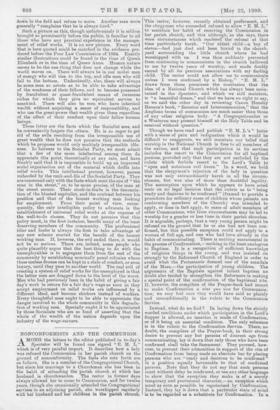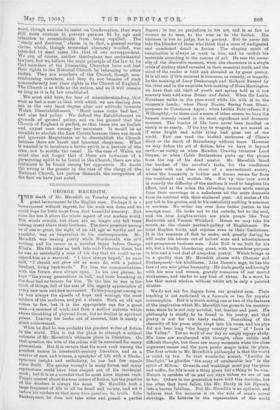NONCONFORMISTS AND THE COMMUNION. A MONG the letters to the editor
published in to-day's Spectator will be found one signed "E. M. L." which is of very painful import. It describes how a lady was refused the Communion in her parish church on the ground of nonconformity. The facts she sets forth are as follows. She is a member of the Congregational Church, but since her marriage to a Churchman she has been in the habit of attending the parish church at which her husband is churchwarden. The rector in former days always allewed her to come to Communion, and for twelve years, though she occasionally attended the Congregational services in an adjoining parish, she worshipped regularly with her husband and her children in the parish .church. This rector, however, recently obtained preferment, and the clergyman who succeeded refused to allow E. L.'" to maintain her habit of receiving the Communion' in her parish church, and this although, as she says, there were circumstances . Whidh rendered the refusal at that time particularly harsh. "Our eldest child—a boy of eleven—bad just died and. been buried in the church- yard surrounding the 'little church where he had worshipped with us. , I was thus suddenly prevented from continuing to communicate in the church hallowed to me by twelve years of worship; and made doubly sacred by all its precious associations With my darling child. The rector could not allow me to communicate unless I were confirmed by a Bishop." "E. M. L." draws from these preinisses the Conclusion that the idea of a National Church which has always been main- tained in the Spectator, and which we still maintain, is "a beautiful dream," and that we have no right to say, as we said the other day in reviewing Canon Hensley Henson's book, "Reunion and Intercominunion," that the Anglican terms of communion are much easier' than those of any other religious body. "A Congregationalist or a Wesleyan may present himself at the Holy Table and be received without question."
Though we have read and publish "E. M. L.'s" letter with a sense of pain and indignation which it would be difficult to exaggerate, we still maintain our belief that worship in the National Church is free to all Members of the nation, and that such participation in its services, includes the resort to the Communion for all baptised pereons, provided only that they are not excluded by the rubric which forbids resort to the Lord's Table to " open and notorious evil livers." In a word, we hold that the clergyman's rejection of the lady in question was not only extraordinarily harsh in all the circum- stances, but was also of more than doubtful legality. The assumption upon which he appears to have acted rests on no legal decision that the rubric as to "being ready and desirous to be confirmed "'(framed to provide a procedure for ordinary cases of children whose parents are conforming members of the Church) was intended to apply, or does in fact apply, to cases of adult members of other Communions, who from circumstances may be led to worship for a greater or less time in their parish churches. It is arguable, perhaps, that a very young person might be refused on the ground that he or she had not been con- firmed, but this possible exception could not apply to a woman of full age, and one who had been already in the habit of communicating. There is nothing sacramental in the process of Confirmation,—nothing in the least analogous to Baptism. It is a recoguitiou of sufficient knowledge of religious things in the young, and was insisted on strOngly by the Reformed Church of England in order to avoid what the Protestants deemed one of the scandals 'of the Mass,—the participation of young children. The arguments of the Baptists against infant baptism no doubt also tended. to strengthen the Reformers in making a special point of the confirmation of the baptismal rite. If, however, the compilers of the Prayer-book had meant to make Coufirmation a sine qua non for CommuniCa- tion, we may feel sure they would have said so plainly and unconditionally in the rubric to the Communion Service.
Instead, what do we find ? In laying down the strictly worded conditions under which participation in the Lord's Supper is allowed, no mention is made of Confirmation, or of it being an essential condition. The only reference is in the rubric to the Confirmation Service. There, no doubt, the compilers of the Prayer-book, in their strong desire to prevent any but persons of discreet age from communicating, lay it down that only those who have been confirmed shall take the Saorament. They proceed, how- ever, to prevent their admonition in support of the rite of Confirmation from being made an absolute bar by placing persons who are " ready and desirous to be confirmed' in a position equally favourable to that of confirmed. persons. Note that they do not say that such persons must without delay be confirmed, or use any other language to show that the exception they make is of a merely temporary and provisional character,—an exception which must as soon as possible be regularised by Confirmation. Instead, they lay it down that a particular state of mind is to be regarded as a substitute for Confirmation. In a, word, though anxious to insist on Confirmation, they were still more anxious to prevent persons fit by age and intention to communicate from being repelled. The !! ready and desirous" clause is, in fact, a general saving clause, which, though somewhat obscurely worded, was intended to meet cases like that of our correspondent. We are, of course, neither theologians nor ecclesiastical lawyers, but we. believe the main principle of the law to be that members Of the Dissenting Churches have not lost their rights in the National Church by belonging to other bodies. They are members of the Church, though non- Conforming members, and they do not because of such nonconformity lose their rights in the Church of England. The Church is as wide as the nation, and so it will remain as long as it is by law established.
We must add here, for fear of misunderstanding, that even so bad a case as that with which we are dealing does not in the very least degree alter our attitude towards Welsh Disestablishment. "Hard cases make bad law," and also bad policy. We defend the Establishment on grounds of general policy, not on the ground that the Church of England is perfect, or that there are no foolish and unjust men among her ministers. It would be as sensible to abolish the Law Courts because there are harsh and ignorant Magistrates as to disestablish the Church because there are harsh and ignorant clergymen. What is wanted is to inculcate a better spirit in a portion of the Crow, not to scuttle the vessel. In the ease of Wales, we Must also not forget that if there are instances of a persecuting spirit to be found in the Church, there are also instances to be found among her opponents. No doubt the wrong is the greater in the case of the clergy of the National Church, but justice demands the recognition of the fact we have just noted.











































 Previous page
Previous page